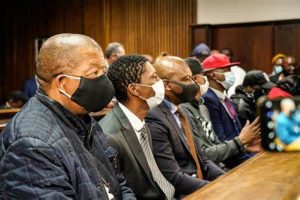
Staff Writer
The National Prosecuting Authority has announced that its star witness, Moroadi Cholota, will now also face charges and stand trial on the R255 million asbestos case, alongside former Free State Premier and suspended ANC Secretary General, Ace Magashule. Cholota apparently was not cooperative when the time came to issue a statement according to the NPA, and will now be extradited to South Africa to stand trial.
Meanwhile, on November 3, Magashule approached the court in an attempt to obtain the list of state witnesses; Magashule has accused the prosecution of politicisation and ineptitude. It is noteworthy that Magashule initially sought to call Ms Cholota as a defence witness, something that may have played a part in her refusal to cooperate.
The Free State asbestos trial relates to the pocketing of around 200 million as part of a project to remove asbestos roofs in the Free State, which was not instituted despite the dispersing of funds, much of which allegedly flowed into the hands of Magashule and his cohort. They have been charged with corruption, fraud and money laundering, with the case now being postponed to February 2022, to allow for the extradition.
Speaking to radio Islam International, Ebrahim Fakir of Asri noted the seriousness of Magashule’s accusations. This, Fakir argued was especially in a context wherein Mr Magashule is a member of the party that is currently tasked with governing, ostensibly accusing his own party of inaptitude and worse politicisation; significantly, Fakir alluded to the fact that no names have been pointed to as a source for this politicisation, and that significantly Mr Magashule, who is currently suspended, may be back in his position by the end of 2022. This is especially in a context wherein the ruling ANC was severely battered in the most recent poll, leading for calls for President Ramaphosa to step aside and take responsibility. “Is he fit to continue? Should he be re-elected? That’s where we’re headed because those debates are happening already and you will see some people, especially those aligned [to] that faction now claiming that no, this was all motivated by us because we advocated for our people to stay away from coming out to vote in these elections and specially to vote for the ANC,” said Fakir. It is significantly that although this faction may be weak when compared to the Ramaphosa faction, they can cause ructions as indicated by the July looting; even if they’re defeated they will take away attention from governing, according to Fakir.
Fakir did, however, note that the charges could be a means of ensuring Cholota returns to the country and/or that further evidence was uncovered regarding her, during the process of investigation, failing which, it does show incompetence, especially in light of the nature of the charges filed.
Regarding coalitions, Fakir alluded to the fact that an ANC-DA coalition would be optimal for South Africa going forward, especially since it would be easier to conclude, assist with oversight, and because both parties had the capacity to do so, but that the leadership does not currently seem to be in favour of such. Fakir also cautioned about coalition building at a local level, without a guiding strategy, especially in light of the multiplicity of parties involved. “So, if they take the national approach, decisions you make in one local municipality may affect your negotiations at another one, and having those deals might affect your ability in the next national election to negotiate things provincially… Say, for example, in Ekurhuleni, you choose to go with party X and Y. There are smaller parties, but you need party A in another municipality, and then Party A tells you in this other municipalities, sorry, we not working with you because what did you do? You went to party A and B.” This, Fakir argues, will lead to total dysfunction and incoherence, and that a coalition between the ANC and DA, in which common principles are thrashed out, will be good for the country.
Concerning the EFF, Fakir alluded to their poorer than expected performance, cautioning that a coalition with them may be bad for the ANC. This is especially since, like the internal contradictions in the party, are themselves a result of such and will thus likely add to these contradictions. This is especially in a context wherein they have certain cardinal pillars they believe need to be shared by coalition partners. Fakir argued that the incorrect assumptions of supposed ideological commonalities, coupled with identity politics may see the ANC and EFF partner, but that this will likely be bad for the ANC. Significantly in this regard Fakir argued that the EFF will likely keep changing its stances, forcing continued negotiations and detrimentally impacting the ANC, which will be in perpetual negotiations.







0 Comments